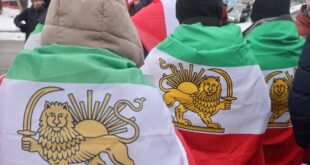 TEHRAN (FNA)- Iran’s Government Spokesman Gholam Hossein Elham said Tehran will not back down on its nuclear stance despite the threat of tighter sanctions.
TEHRAN (FNA)- Iran’s Government Spokesman Gholam Hossein Elham said Tehran will not back down on its nuclear stance despite the threat of tighter sanctions.
“Iran’s nuclear stance is strong and transparent and this stance would not change through any sanction or threat,” Elham told reporters after a cabinet session on Sunday, adding, “We still believe that the nuclear talks are progressing.”
Washington and its Western allies accuse Iran of trying to develop nuclear weapons under the cover of a civilian nuclear program, while they have never presented any corroborative document to substantiate their allegations. Iran denies the charges and insists that its nuclear program is for peaceful purposes only.
Tehran stresses that the country has always pursued a civilian path to provide power to the growing number of Iranian population, whose fossil fuel would eventually run dry.
Despite the rules enshrined in the Non-Proliferation Treaty (NPT) entitling every member state, including Iran, to the right of uranium enrichment, Tehran is now under three rounds of UN Security Council sanctions for turning down West’s illegitimate calls to give up its right of uranium enrichment.
Tehran has dismisses West’s demands as politically tainted and illogical, stressing that sanctions and pressures merely consolidate Iranians’ national resolve to continue the path.
“It is important that our country is ready to insist on its rights under any conditions,” Elham underscored.
He said that the five permanent members of the UN Security Council (UNSC) – The United States, Russia, China, Britain and France – plus Germany have no consensus on imposing new sanctions against Iran.
Certain countries are willing to make use of the new sanctions as a political tool and such a move will bear no fruit and can only be considered as a psychological propaganda campaign, stressed the spokesman.
“The Islamic Republic of Iran will resist such moves and will not retreat from its rights,” Elham said.
Iran has so far ruled out halting or limiting its nuclear work in exchange for trade and other incentives.
Iran insists that it will continue enriching uranium because it needs to provide fuel to a 300-megawatt light-water reactor it is building in the southwestern town of Darkhoveyn as well as its first nuclear power plant in the southern port city of Bushehr.
Iran has repeatedly said that it considers its nuclear case closed after it answered the UN agency’s questions about the history of its nuclear program.
The European Union (EU) issued a decree on Friday to consider fresh UNSC sanctions against Iran over its controversial nuclear program.
The EU presidency decreed that its financial institutions must exercise restraint on export credits to Iran and that its 27 member states inspect Iran-bound cargoes.
Chairman of National Security and Foreign Policy Commission of Iran’s parliament Alaeddin Boroujerdi said Saturday that imposing new sanctions on the Islamic Republic will harm the West.?
Elham further voiced Tehran’s readiness to make use of appropriate tactics if needed.
The United States and Britain said on Wednesday the six had agreed to consider more UN sanctions against Iran after Tehran failed to give up NPT right of uranium enrichment, but Russia said there was no firm deal.
Iran gave a noncommittal, one-page letter this week to the six powers containing no reply to their offer to refrain from seeking more UN penalties if Iran froze expansion of its nuclear work.
Tehran promised a “clear response” at an unspecified date, stressing that there reside certain ambiguities in the western countries’ proposals, which need to be removed first.
Washington’s push for additional UN penalties contradicts the report by 16 US intelligence bodies that endorsed the civilian nature of Iran’s programs. Following the US National Intelligence Estimate (NIE) and similar reports by the IAEA head – one in November and the other one in February – which praised Iran’s truthfulness about key aspects of its past nuclear activities and announced settlement of outstanding issues with Tehran, any effort to impose further sanctions on Iran seems to be completely irrational.
The February report by the UN nuclear watchdog, the International Atomic Energy Agency, praised Iran’s cooperation in clearing up all of the past questions over its nuclear program, vindicating Iran’s nuclear program and leaving no justification for any new UN sanctions.
Political analysts believe that the United States has remained at loggerheads with Iran over the independent and home-grown nature of Tehran’s nuclear technology, which gives the Islamic Republic the potential to turn into a world power and a role model for other third-world countries. Washington has laid much pressure on Iran to make it give up the most sensitive and advanced part of the technology, which is uranium enrichment, a process used for producing nuclear fuel for power plants.
Observers believe that the shift of policy by the White House to send William Burns – the third highest-ranking diplomat in the US – to the talks with Iran happened after Bush’s attempt to rally international pressure against Iran lost steam due to the growing international vigilance.
US President George W. Bush finished a tour of the Middle East in winter to gain the consensus of his Arab allies to unite against Iran.
But hosting officials of the regional nations dismissed Bush’s allegations, describing Tehran as a good friend of their countries.
Many world nations have called the UN Security Council pressure against Iran unjustified, especially in the wake of recent IAEA reports, stressing that Tehran’s case should be normalized and returned to the UN nuclear watchdog due to the Islamic Republic’s increased cooperation with the agency.
 Eurasia Press & News
Eurasia Press & News



